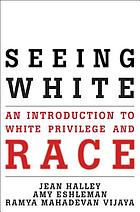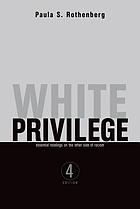"Privilege exists when one group has something of value that is denied to others simply because of the groups they belong to, rather than because of anything they’ve done or failed to do. Access to privilege doesn’t determine one’s outcomes, but it is definitely an asset that makes it more likely that whatever talent, ability, and aspirations a person with privilege has will result in something positive for them.”
- Peggy McIntosh, cited and linked below
Even though privilege doesn't merely have to do with one's race, here in America white privilege is often what is first thought of or addressed when privilege is discussed. Here, we hope to eventually add more resources to address more than just race-based privilege. There is a page in this guide dedicated to the ideas of whiteness, white superiority, and white supremacy.
Privilege & Intersectionality - Some areas of privilege
Use the links below to access the films featured here, or consider searching in the library's collection to find related streaming films.
The excerpt below comes from an article called "Understanding Race and Privilege" from the National Association of School Psychologists.
Wildman & Davis (1995) explain that “the lives we lead affect what we are able to see and hear in the world around us.” As such, an important first step to understanding the concept of group-based privilege and how it can shape peoples’ perspectives, experiences, and interactions is to examine our own experience. We can be the beneficiary of privilege without recognizing or consciously perpetuating it. Learning to see one’s own privilege as well as that of groups and systems can create an important pathway to self-discovery. Some questions to consider are listed below.
National Association of School Psychologists. (n.d.). Understanding race and privilege. National Association of School Psychologists. Retrieved April 22, 2022, from https://www.nasponline.org/ resources-and-publications/resources-and-podcasts/diversity-and-social-justice/social-justice/ understanding-race-and-privilege
Sources cited on this page:
Rothenberg, P. S. (2011). White privilege : Essential readings on the other side of racism. Worth Publishers.

ProQuest Ebook Central

Main collection

Ebsco ebook collection
“White Privilege is the other side of racism. Unless we name it, we are in danger of wallowing in guilt or moral outrage with no idea of how to move beyond them. It is often easier to deplore racism and its effects than to take responsibility for the privileges some of us receive as a result of it… once we understand how white privilege operates, we can begin addressing it on an individual and institutional basis.”
-Paula Rothenberg, from "White Privilege: Essential Readings on the Other Side of Racism"
(cited below)
See the tab in this guide called "Whiteness & White Supremacy" for more about white or racial privilege